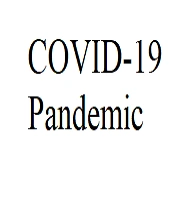Dear Editor,
Coronavirus disease 2019 (COVID-19) is known as a public health emergency and has been stated a global pandemic by the World Health Organization (WHO) (1). The world is currently encountering an evolving and unprecedented condition in all aspects of life and health (2). This disease is caused by the novel severe acute respiratory syndrome coronavirus and it is spreading rapidly and so far no specific treatment or vaccine is available and there is no pre-existing immunity to it in the world population (1).
Patients with cancer are in a vulnerable state and are twice as likely to be infected as the general population (1). Their immune systems are weakened by malignancy or anti-cancer therapies, and they are more likely to have adverse outcomes and serious conditions, which lead to hospitalization in the intensive care unit (ICU) or more death (2).
Therefore, the process of treatment, care and support, follow-up, and hospital routine visits in these patients is delayed or stopped to reduce exposure to COVID-19 and its transmission (3).
Moreover, these conditions pose a threat to provide supportive and palliative care for patients with cancer during the pandemic (4). Therefore, patients with cancer and their families face many challenges during the COVID-19 pandemic, which will cause serious problems, worries, and concerns for them in a long time (3).
To reduce these issues, some available resources and strategies should be considered to minimize disruption in the treatment process and lack of access to education, care, and support services during the Covid-19 pandemic (1). Supportive care should be provided to assess, develop, and implement creative solutions in health care system to facilitate consistency of care and support and to change this threat to an opportunity and an effective step to decentralize the services in the health care system (3).
Supportive care is defined as those services that are provided to prevent and manage the side effects of cancer and its treatment and to meet patients’ physical, emotional, social, psychological, informational, spiritual, and practical needs during the diagnostic, treatment, and follow-up phases (5).
Virtual Social Network(VSN) seems to be a good opportunity to support patients, decrease health care costs and the number of patients’ visits, improve access to supportive care, and reduce the pressure on health systems and health care providers (HCP) during the pandemic (1). The ease of access and extensive capabilities of mobile devices, including services based on VSNs, make them excellent tools for planning, implementing, evaluating health interventions, educating, and supporting patients in the health system as well as patients with cancer (6-8). This method is able to remove the obstacles of traditional and face-to-face education during the COVID- 19 pandemic and maintaining a safe environment for patients and HCP (2).
VSNs provide the ability to send a variety of text, audio, and educational videos at any time and place (8), as long as needed, and are able to support patients by establishing online communication between the HCP and the patient, which is led to better disease management (9). In this method, home care services, supportive and palliative care including spiritual care, and even end-of-life care can be provided as much as possible for patients during the Covid-19 pandemic (4).
Extensive efforts should be accompanied through regular monitoring and active communication with patients to reduce or meet their different needs, to support patient self-management, oncology exercise , and to provide survival care services during the pandemic. In these special circumstances, such programs, as well as psychological interventions, can relieve the patient's isolation and loneliness. On the other hand, VSNs can help reduce the burden on healthcare systems and HCPs, due to shortage of health human resource and medical supplies (2).
Hence, providing necessary infrastructure, planning, implementing, evaluating, and formulating standard recommendations for extensive use of technology seems a crucial priority for policymakers in order to promote quality of cancer care.
